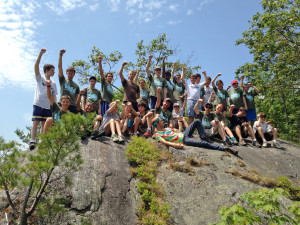As an avid and unapologetic reader of novels, I very rarely get excited about the publication of a non-fiction book. (Compared, for example, to the thrill I feel whenever I think about the May 8th release of John Irving’s next novel!) Yet, here I am, devoting this blog post to a parenting book coming out on May 1st.
Homesick and Happy: How Time Away from Parents Can Help a Child Grow is the newest work by Michael Thompson, author of (amongst others) Raising Cain and Best Friends, Worst Enemies – Understanding the Social Lives of Children. If you’ve read his books, or been lucky enough to hear him speak, you know that Dr. Thompson really understands child development and that he shares the results of his research with humor, compassion and warmth. In a recent issue of the American Camp Association magazine, he described his approach to writing Homesick and Happy. Rather than criticize overprotective parents, he empathizes with every parent who wants what’s best for his/her child … and makes the case for going away to sleepaway camp as a critical step in a child’s social and emotional development.
Here is Amazon’s description of the book:
In an age when it’s the rare child who walks to school on his own, the thought of sending your “little ones” off to sleep-away camp can be overwhelming—for you and for them. But parents’ first instinct—to shelter their offspring above all else—is actually depriving kids of the major developmental milestones that occur through letting them go—and watching them come back transformed.
In Homesick and Happy, renowned child psychologist Michael Thompson, PhD, shares a strong argument for, and a vital guide to, this brief loosening of ties. A great champion of summer camp, he explains how camp ushers your children into a thrilling world offering an environment that most of us at home cannot: an electronics-free zone, a multigenerational community, meaningful daily rituals like group meals and cabin clean-up, and a place where time simply slows down. In the buggy woods, icy swims, campfire sing-alongs, and daring adventures, children have emotionally significant and character-building experiences; they often grow in ways that surprise even themselves; they make lifelong memories and cherished friends. Thompson shows how children who are away from their parents can be both homesick and happy, scared and successful, anxious and exuberant. When kids go to camp—for a week, a month, or the whole summer—they can experience some of the greatest maturation of their lives, and return more independent, strong, and healthy.
At Camp Akeela, we talk to campers all the time about how it’s okay to feel both homesick (sad about missing their parents, siblings, pets, house, bed, foods, etc.) AND happy (glad to be making new friends, having new experiences, feeling confident and valued, etc.) at the same time. As Dr. Thompson seems to understand, we have very similar conversations with the campers’ parents! Every parent who sends their child into our care makes a decision to tolerate their own anxiety in exchange for the unique and life-changing benefits that camp has to offer.
— Eric

 The fall is always a bitter-sweet time for us as camp directors. On the one hand, there is a sense of relief to be settled back into our lives at home. And having our own daughters situated with new teachers at school and to be able to plan and cook our own meals! On the other hand, there’s always a sadness and loneliness that we feel as well. We work with an amazing team at camp and love sharing ideas with them. Also we love being a part of a larger community – of walking into breakfast and seeing 200 smiling faces, having fun conversations with campers all day. And also hearing about all of their successes and helping them through struggles.
The fall is always a bitter-sweet time for us as camp directors. On the one hand, there is a sense of relief to be settled back into our lives at home. And having our own daughters situated with new teachers at school and to be able to plan and cook our own meals! On the other hand, there’s always a sadness and loneliness that we feel as well. We work with an amazing team at camp and love sharing ideas with them. Also we love being a part of a larger community – of walking into breakfast and seeing 200 smiling faces, having fun conversations with campers all day. And also hearing about all of their successes and helping them through struggles.

 Check out
Check out